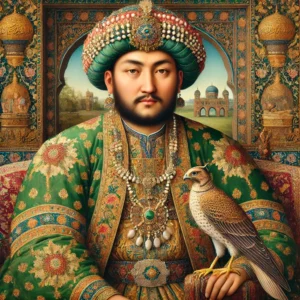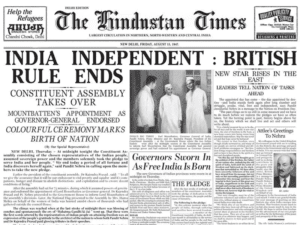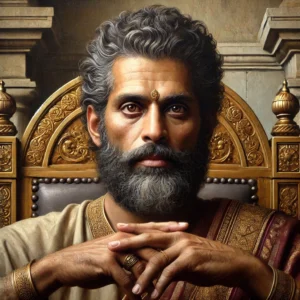
Early Life and Background
Dara Shikoh was born on March 20, 1615, in Ajmer, Rajasthan, as the eldest son of Mughal Emperor Shah Jahan and Empress Mumtaz Mahal. Raised in the opulent Mughal court, he received an extensive education in Persian, Arabic, and Sanskrit. Unlike his younger brothers, particularly Aurangzeb, Dara was more inclined toward literature, philosophy, and mysticism rather than military affairs. He developed a deep interest in Sufism and Indian spirituality, which later shaped his vision for a pluralistic and inclusive empire.
Dara’s upbringing was marked by access to some of the finest scholars, poets, and artists of the Mughal court. He was known for his deep discussions with theologians and philosophers, which broadened his perspectives on religion and governance. His fondness for Persian poetry, particularly Rumi and Hafiz, influenced his spiritual outlook, making him a firm believer in religious unity. His worldview contrasted sharply with Aurangzeb’s more rigid and orthodox approach to Islam, foreshadowing the ideological struggle that would later define their rivalry.
Chosen Heir to the Throne
Shah Jahan favored Dara Shikoh as his successor due to his intelligence, refined sensibilities, and liberal outlook. Dara was deeply loved by his father and held the title of “Shahzada-e-Buland Iqbal” (Prince of High Fortune). Unlike his brother Aurangzeb, who built his reputation through military campaigns, Dara was known for his administrative abilities and engagement with intellectual and religious circles.
To prepare him for rulership, Shah Jahan appointed Dara as the governor of key Mughal provinces, including Punjab, Allahabad, and Gujarat. His tenure in these regions demonstrated his diplomatic skills and commitment to fair governance. He cultivated alliances with Hindu nobles and maintained strong relationships with Rajput chiefs, ensuring a more cohesive administration.
However, his perceived favoritism by Shah Jahan alienated several factions within the Mughal court. Many nobles and military commanders resented his lack of battlefield experience and viewed his liberal policies as a threat to the empire’s Islamic identity. His preference for scholars and mystics over hardened warriors further weakened his support among the traditional power brokers of the Mughal state.
Intellectual Contributions and Religious Philosophy
Dara Shikoh is remembered as a scholar and visionary who sought to bridge Hindu and Islamic traditions. His magnum opus, Majma-ul-Bahrain (The Confluence of Two Oceans), explored the philosophical commonalities between Sufism and Advaita Vedanta. He believed that the Upanishads contained divine wisdom that complemented Islamic teachings, leading him to translate them into Persian in Sirr-e-Akbar (The Great Secret). His translations later played a crucial role in introducing Indian philosophy to European scholars in the 18th century.
Dara’s religious inclusivity extended to his interactions with Hindu saints, Brahmins, and Sikh Gurus. His association with Guru Har Rai, the seventh Sikh Guru, and his patronage of Hindu scholars reflected his vision of an empire where different faiths coexisted harmoniously. However, these liberal beliefs made him unpopular among orthodox Sunni clerics and conservative Mughal nobles.
His writings also included Safinat-ul-Auliya and Sakinat-ul-Auliya, works dedicated to the biographies of Sufi saints. His deep admiration for figures like Moinuddin Chishti and Nizamuddin Auliya reinforced his Sufi credentials and further alienated the conservative ulema, who viewed Sufism as a deviation from orthodox Islam.
The Political Climate and the War of Succession
During the late years of Shah Jahan’s reign, the Mughal Empire was at its peak, but internal factionalism threatened its stability. The empire’s nobility was divided between those who supported Dara’s inclusive policies and those who favored a more conservative and militaristic rule, as represented by Aurangzeb. Shah Jahan’s prolonged illness in 1657 triggered a brutal war of succession among his four sons—Dara Shikoh, Aurangzeb, Shuja, and Murad.
Dara initially held the advantage, controlling the imperial capital and enjoying his father’s support. However, his lack of military expertise proved costly. Aurangzeb, a seasoned military commander, strategically allied with his younger brothers and decisively defeated Dara at the Battle of Samugarh in 1658. Forced to flee, Dara attempted to rally support but was eventually betrayed, captured, and brought to Delhi.
Aurangzeb’s propaganda machine painted Dara as a heretic who had abandoned Islam in favor of Hindu beliefs. This perception, combined with his military failures, led to his swift downfall.
Execution and Aurangzeb’s Justification
On Aurangzeb’s orders, Dara was humiliated, paraded through the streets of Delhi in chains, and charged with apostasy and heresy due to his engagement with Hindu philosophy. The orthodox clergy, who saw Dara’s interpretations as blasphemous, supported Aurangzeb’s decision. He was executed on August 30, 1659, and his body was buried in an unmarked grave in Humayun’s Tomb.
Aurangzeb’s decision to eliminate Dara was as much about consolidating power as it was about religious ideology. By presenting himself as the guardian of orthodox Islam, Aurangzeb secured the support of the conservative nobility and the ulema, ensuring his uncontested rule.
What If Dara Shikoh Had Become Emperor?
Had Dara Shikoh ascended to the Mughal throne instead of Aurangzeb, the trajectory of Indian history might have been significantly different. His emphasis on religious harmony and cultural synthesis could have fostered a more inclusive empire, preventing the sectarian policies that later contributed to Mughal decline. Unlike Aurangzeb, whose rigid orthodoxy alienated non-Muslims and led to continuous rebellions, Dara’s approach might have strengthened internal stability and prolonged Mughal prosperity.
Additionally, his patronage of Hindu and Sikh leaders could have ensured a more unified Indian society, potentially resisting the rise of British colonialism. His diplomatic and philosophical inclinations might have led to stronger alliances with European powers on intellectual and economic fronts rather than military confrontations.
A Dara-led empire may have also fostered greater advancements in science, literature, and philosophy, given his patronage of intellectual discourse. His rule could have seen a flourishing of Persian, Sanskrit, and Arabic scholarship, leading to a renaissance in Indo-Islamic culture.
Legacy
Dara Shikoh’s legacy remains that of a scholar, philosopher, and advocate of religious unity. His tragic fate underscores the perils of intellectual idealism in the face of political pragmatism. While Aurangzeb’s reign extended the Mughal Empire territorially, it also sowed the seeds of its fragmentation. His over-reliance on military expansion and religious orthodoxy ultimately alienated key sections of the population, weakening the empire from within.
In contrast, a Dara-led India might have embraced a more pluralistic and prosperous future. His vision of a syncretic, inclusive empire was centuries ahead of its time, and many of his ideals resonate in modern India’s diverse cultural fabric. Today, as discussions on religious harmony and cultural synthesis continue, Dara Shikoh’s ideals remain more relevant than ever, reminding us of the possibilities that were lost with his untimely demise.






